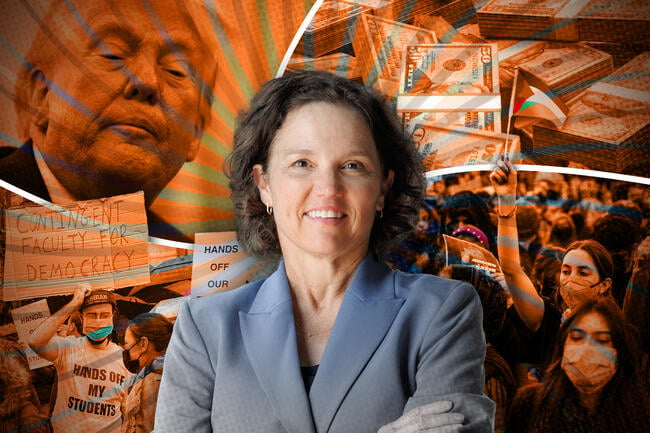You have /5 articles left.
Sign up for a free account or log in.

Armstrong led Columbia for seven tumultuous months.
Photo illustration by Justin Morrison/Inside Higher Ed | Sirin Samman/Columbia University | Anna Moneymaker and Spencer Platt/Getty Images | mirza kadic/iStock/Getty Images | Ryan Quinn/Inside Higher Ed
After stepping down as interim president of Columbia University late last month, Katrina Armstrong will take a sabbatical from Columbia’s Irving Medical Center, where she has served as chief executive officer since 2022, the institution announced Sunday in a brief statement.
Armstrong is taking a sabbatical to spend time with her family, the university noted.
Armstrong led Columbia for a mere seven months after her predecessor, Minouche Shafik, resigned abruptly in August amid scrutiny from Congress and faculty members over her handling of pro-Palestinian protests. As president, Armstrong yielded to a list of sweeping demands from the Trump administration, overhauling disciplinary processes, adding 36 officers with the authority to make arrests and enacting other changes in an effort to regain $400 million in federal funding frozen by the administration.
Armstrong’s acquiescence to the Trump administration sparked concerns among many Columbia faculty members and others in higher education who wanted to see the university fight back. The Trump administration has not restored the frozen funds but has voiced approval of the changes.
Columbia announced the sabbatical the same day that the Washington Free Beacon, a conservative news outlet, published a transcript of a deposition Armstrong gave to the Department of Health and Human Services as part of the ongoing civil rights investigation into the university.
In the transcript from the April 1 deposition, Armstrong responded multiple times that she had “no memory” of various antisemitic events alleged to have occurred at Columbia.
Armstrong also seemed fuzzy on the changes she enacted in response to Trump’s demands.
“Did you do anything as the interim president to implement these recommendations?” asked Sean Keveney, acting general counsel at the Department of Health and Human Services.
Armstrong responded that she had “stood up against all forms of harassment and discrimination, including antisemitism. While the last year is very much a blur … the administration is deeply committed to addressing antisemitism,” she said, adding that she would “need to look at specifics.”
Armstrong also expressed uncertainty about whether or not she had reviewed a letter from the General Services Administration stating that Columbia’s funding was under review, responding that she had received what “feels like dozens of letters,” some of which had multiple signatories.
“Do you remember a point in the last month when the federal government stopped funding to the University of Columbia?” a government official asked, incorrectly stating the institution’s name.
“I think I would have to understand more specifically what you’re referring to,” she responded.
Armstrong’s lack of recollection seemed to prompt frustration.
“I guess I’m just trying to understand how you have such a terrible memory of specific incidents of antisemitism when you’re clearly an intelligent doctor?” Keveney asked Armstrong at one point.
That question and a related one drew objections from Columbia’s legal counsel.
In other parts of the deposition, Keveney pressed Armstrong on whether she walked back an agreement to clamp down on masks at protests. While Armstrong enacted certain changes that would require protesters to remove their masks when asked to do so by university officials, she reportedly downplayed the notion of a ban on face coverings in a meeting with faculty members last month.
“Isn’t it true that in private with the faculty, you backed away from what you said the university was going to do?” Keveney asked, referencing a faculty meeting held on Zoom in late March.
Armstrong denied doing so, citing a public statement after that meeting that reiterated her commitment to the agreement with the Trump administration. She told the HHS attorney, “I have been and remain and have always been fully committed to the steps in that statement.” She added that those steps “are the right thing to do for Columbia” and for its students.
The deposition also revealed the challenges she faced on the job in recent months.
“It’s obviously been an incredibly difficult period for me, for the university,” Armstrong said in one of multiple responses that showed the immense pressure she was under as interim president.
Columbia’s Board of Trustees responded to Inside Higher Ed’s request for comment on the latest news about Armstrong with a statement that read, “Columbia University is firmly committed to resolving the issues raised by our federal regulators, with respect to discrimination, harassment, and antisemitism, and implementing the policy changes and commitments outlined in our March 21st letter. This testimony does not reflect the hard work undertaken by the University to combat antisemitism, harassment, and discrimination and ensure the safety and wellbeing of our community.”
Columbia’s medical school will continue under interim leadership, which has been in place since Armstrong assumed the interim presidency. Columbia also has a new interim president in place: Last month the Board of Trustees elevated fellow member and co-chair Claire Shipman to the role.




